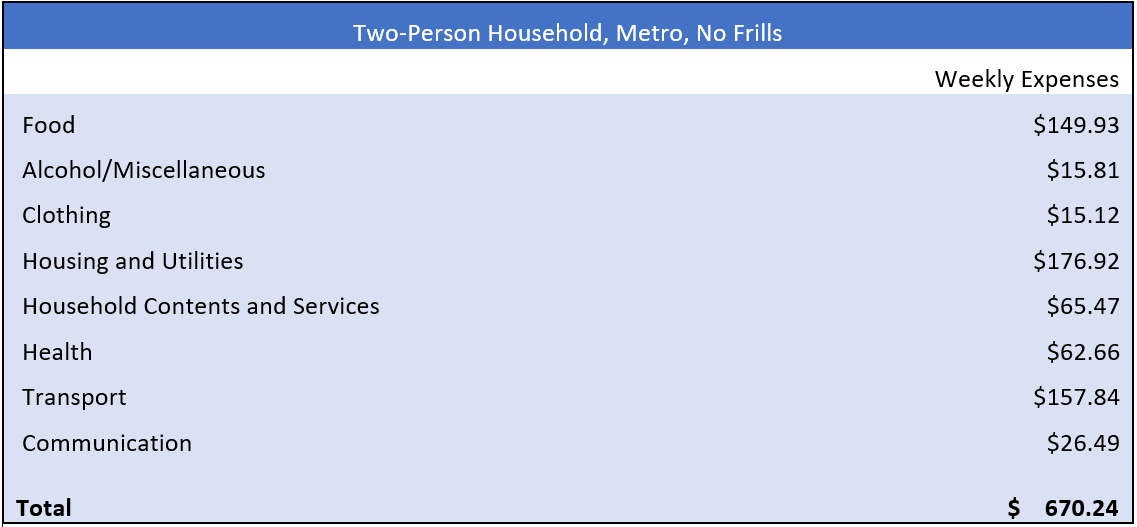Weekly Expenses in Retirement
Preparing for retirement can be a daunting task, and seeing that you may need savings of up to $809,000 to retire will only make it seem even more so. So, an easy way to make this seem more attainable and less daunting is by breaking down what your necessary weekly expenses could be in retirement instead.
To work out how much this might be, you need to understand what your retirement could look like. This will be dictated by your individual circumstances like your savings and the lifestyle you want to lead throughout your possible 20+ years of retirement. Two factors that are important to consider are the location you plan on retiring to and whether you’ll be retiring as an individual or a couple.
Weekly expenses among retirees vary greatly, with those living in provincial areas showing significantly fewer expenses than those living in metropolitan or urban areas. Whereas, lifestyle will also vary among retirees depending on if you plan on living a relatively frugal retirement or plan on living a little will have a large impact on your weekly expenses.
What this could look like for you
Now, let's get into the nitty-gritty to see what retirement could look like for you. The following data comes from Massey University's Fin-Ed department, publishing a yearly report that shows the current expenditure guidelines for retirees. This study takes into account the NZ Superannuation but identifies that its ability to provide for retirees isn’t what it once was. The gap between weekly expenses and what the superannuation can provide is growing, this has led to the superannuation being viewed as a supplementary income for retirement rather than something to solely rely upon.
Single-person households currently receive $436.94 a week from superannuation, whereas two-person households receive $672.22. And depending on your circumstances this could mean you require anywhere between $74.59 to $798.04 additional income per week to meet living expenses depending on your retirement plan. Respectively, these statistics represent a two-person household, living frugally in a provincial area and a two-person household, living with more choices in a metropolitan area. See below for a more in-depth analysis, and note where you fall within the lifestyles below.
Breaking down your weekly expenses
Now that we've identified how lifestyle factors into retirement, let's dive deeper into what the breakdown of your weekly expenses could look like. Take Peter and Anna's projected weekly expenses below (Names changed). They've chosen to retire with a no-frills lifestyle in a metropolitan area, and their expenses reflect this.

How to prepare
Planning well for retirement can make the difference between living out your dream retirement or having to retire late and making compromises for your retirement life.
The key to planning for retirement is to start early, and the earlier you start the more beneficial and impactful it will be for your returns leading up to your retirement. Once retired, lifestyles and spending habits will change over time, whether due to travel expenses earlier in retirement or healthcare expenses later on in life as you age.
Budgeting for your unique circumstances can help give an indication of what your weekly expenses will look like, taking into account things such as health needs, living arrangements and general retirement activities. Considering all of these retirement costs, another contributing factor that makes planning so vital is inflation. If you choose to budget and plan out your retirement yourselves it is crucial to take inflation into account, and we’d be happy to provide the formula and templates for you to plan your retirement yourself.
On the other hand, at no charge to yourself, National Capital can work out all the finer details for you. Simply complete our KiwiSaver Healthcheck below and we can help get you on track with your KiwiSaver to a secure retirement.
General rules of thumb
In the past, you may have heard general financial advice regarding how much you need to save to retire comfortably, or even how much you can expect to spend in retirement. One often-touted rule of thumb is that 10% of your income saved and invested per year will set you right for retirement. Although being able to save and invest 10% of your income will help contribute towards retirement, this rule of thumb is largely inaccurate and doesn’t take into consideration many factors and individual circumstances. Time until retirement and earning potential are two such things that make generalisations like this redundant.
So unfortunately there is no one-size-fits-all approach to retirement that will suit everyone. However, planning for retirement based on your individual circumstances is key, and there are some steps you can take that will give you an indication. Let's look at some more reliable guidelines that can help you prepare for retirement:
- Review your current expenses and identify those that will continue and those that will stop in retirement. As mentioned earlier, lifestyles will change over retirement and your expenses will experience high and low periods as a result of travel or healthcare for example. Projecting your expenses can give you an accurate indication of your retirement expenses.
- Assess your timeframe until retirement, and income during this time. Your earning potential and desired lifestyle can have a large impact on when you can realistically retire. Income during retirement, whether it be from a part-time job or elsewhere can help reduce your reliance on superannuation as well. Read more about what options are available for KiwiSaver when you retire and keep your money working for you.
- Spend roughly 4% of your retirement savings per year. Note: not a hard and fast rule but rather a guideline you can work with. As mentioned above, this must be viewed as a guide only. Fine-tuning your withdrawals to reflect how global markets are performing is a must, as you may need to make changes to your withdrawals during more volatile periods.
- Asset allocation, how will your assets and investments keep you comfortable throughout retirement. Assuring that your retirement savings are invested appropriately to carry you throughout retirement is key. Allowing for short, medium and long-term investments to keep you secure throughout retirement.
Seek financial advice
Planning for retirement can easily become overwhelming, but what's important to know is that delaying your planning will only make it worse for you in the long run. With rising costs of living and the decreasing ability of the NZ superannuation to provide for retirees, we must rely upon ourselves to live the lifestyle we want in retirement. The planning involved in preparing for retirement can become quite complex, so in that case, you may choose to talk to a financial advisor.
Financial advisors like us here at National Capital can work out all the finer details for you and make recommendations based on your circumstances. We’re here to help, so if you’re 10 years from retirement or 40 don’t hesitate to reach out and we’ll help get you on the right path to having #onelessmoneyworry.





